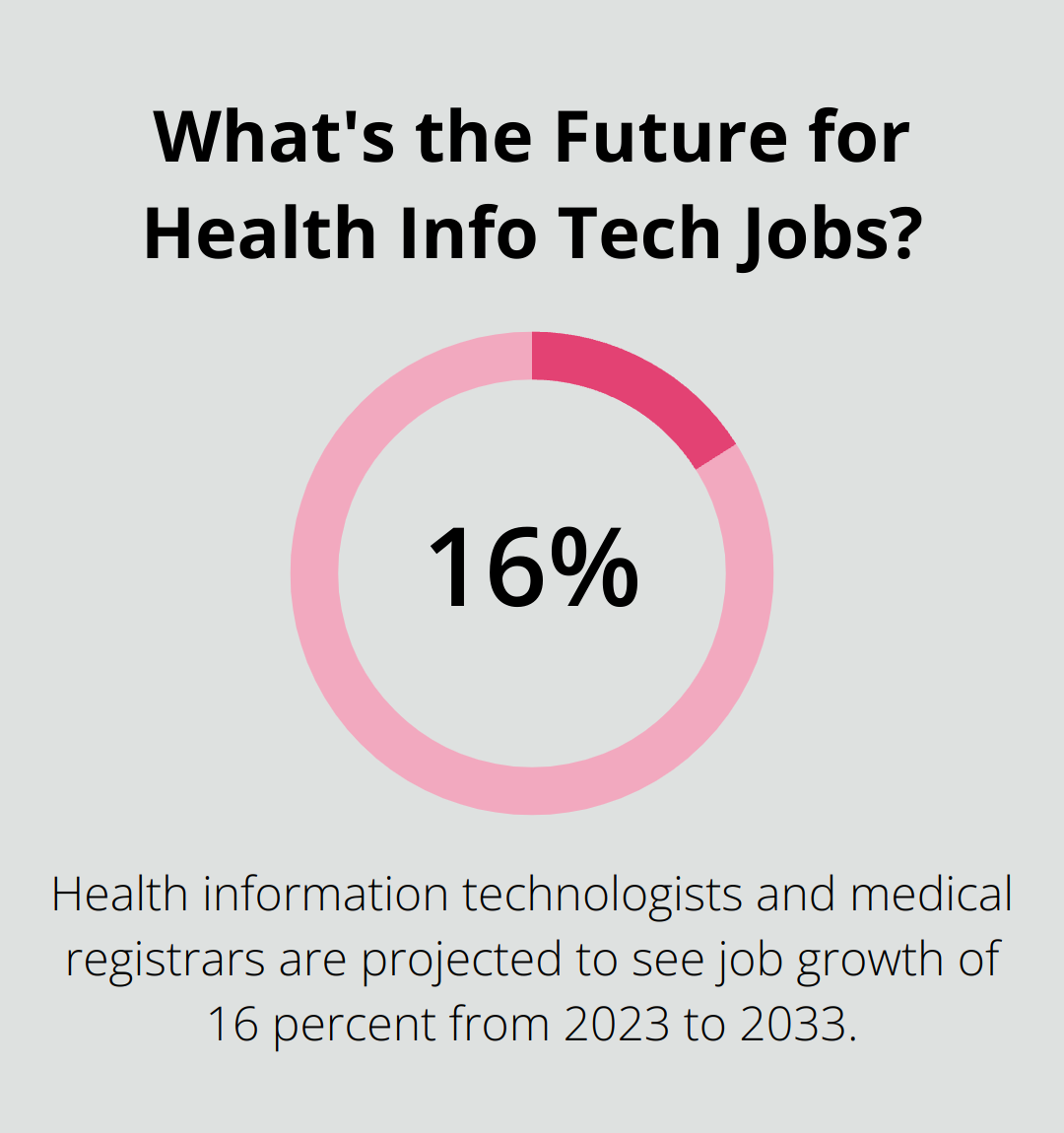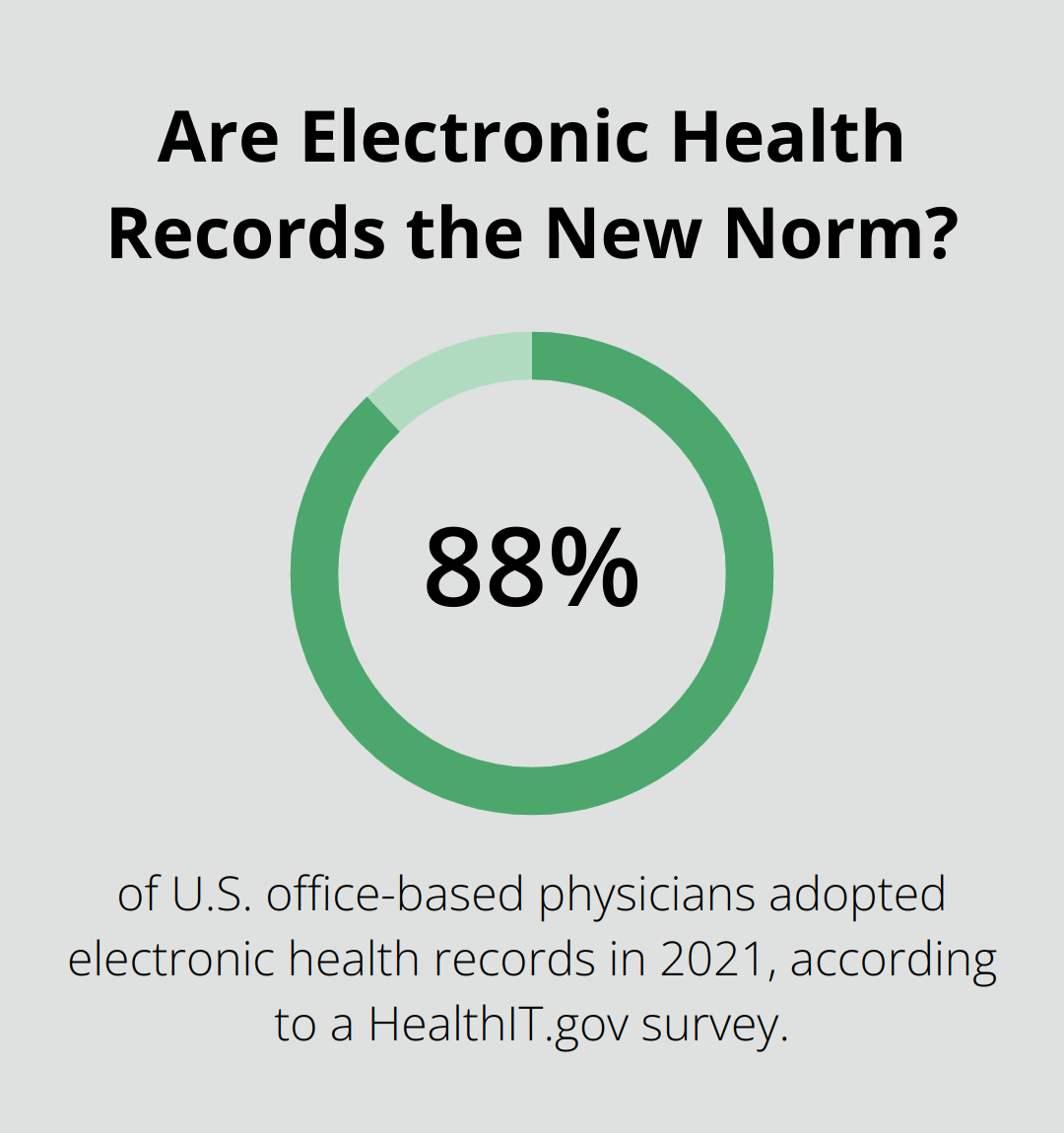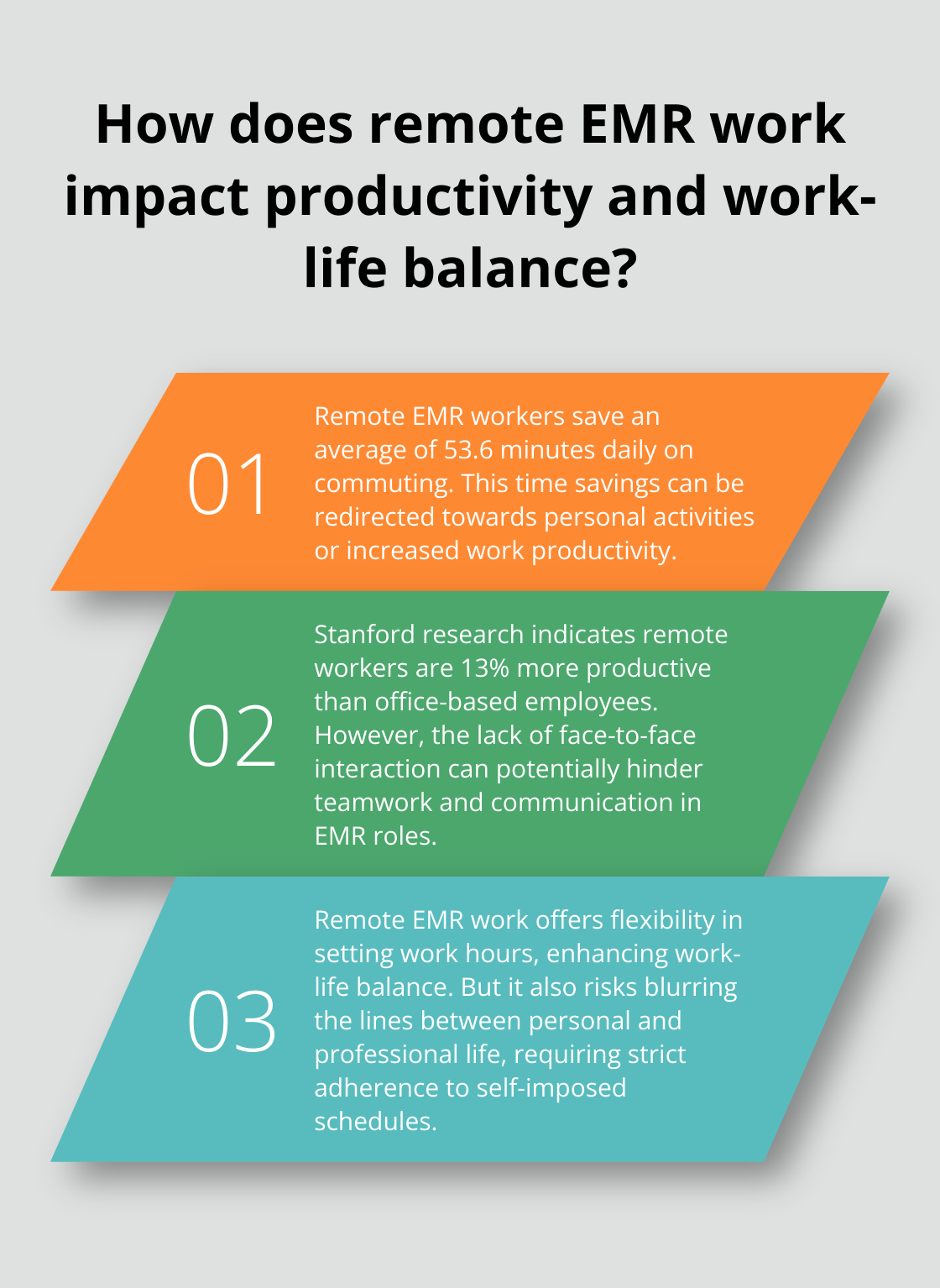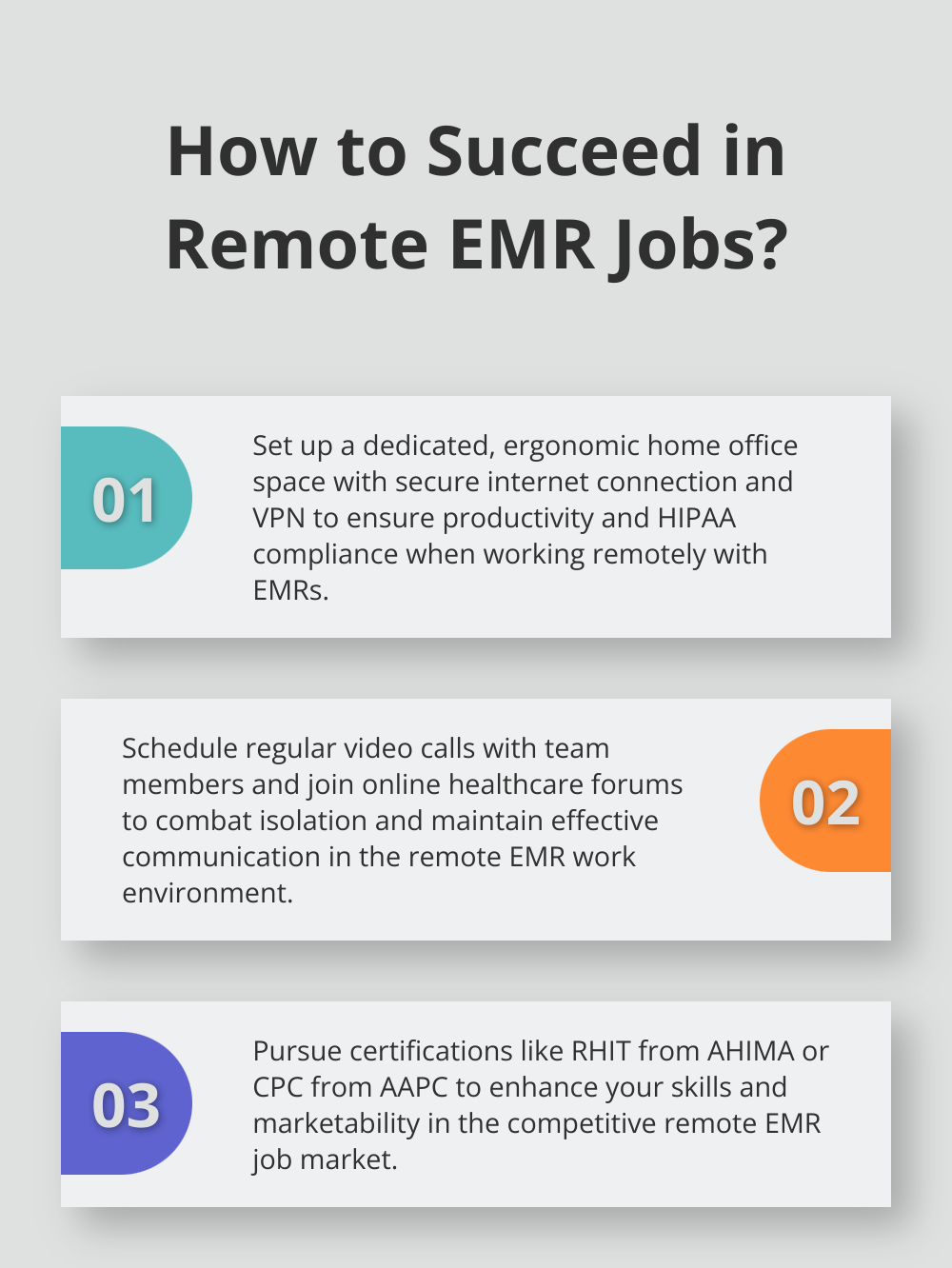The healthcare industry—what a ride, huh? It’s changing faster than you can say “electronic medical records” (EMR). And at the tip of this spear of transformation? You guessed it—EMRs. Over at ScriberJoy, we’ve seen a wave, a veritable tsunami, of remote EMR jobs. It’s like a new frontier—professionals tapping away from the comfort of their couch.
Let’s drill down into this, shall we? This post? It’s your guide. We’ll unpack the kinds of remote EMR gigs out there, the skills you gotta bring to the table, and—oh yes—the sweet perks and pesky hurdles of working remotely in this space. Whether you’re a grizzled healthcare veteran or a newbie taking your first steps, getting a grip on the remote EMR job scene is a must. It’s the digital health era, folks—adapt or get left behind.
Remote EMR Job Types
The remote Electronic Medical Records (EMR) universe-ever-expanding, chock-full of opportunities. What’s out there in this brave new digital health world? Let’s dive into the typical remote EMR gigs you’ll bump into today.
EMR Specialists: The System Gurus
EMR consultants are like the secret sauce for EMR deployment, tinkering, and optimization (think healthcare IT meets project management). These digital dynamos keep EMR systems running smoothly-beam up accuracy, easy access, and security for patient data.

Virtually, EMR Specialists swoop in to save the day with virtual support-troubleshoot system hiccups, run online training boot camps. A quick nod to the Bureau of Labor Statistics, which says health information technologists and medical registrars should see boomin’ job growth of 16 percent from 2023 to 2033-doubling down on the average.
Clinical Documentation Improvement Specialists: The Detail Detectives
These folks-precision kings and queens-nail the link between clinical work and tip-top documentation. They comb through patient files, check those codes, and collaborate with healthcare stars to up the ante on medical docs.
Remote? No prob. CDI pros go Sherlock on digital health records, chat securely with medical teams, spotlight documentation wizardry. If you believe the American Health Information Management Association (AHIMA), these sleuths rake in between $70K and $100K annually (experience and credentials matter, folks).
Health Information Management Professionals: The Data Maestros
Health Information Management (HIM) maestros orchestrate patient health info from start to finish. Database management? Check. Healthcare regulations? Check. Policy-making for access and security? Triple check.
From afar, they turn into data analysis whiz-kids, fine-tuning quality assurance, tackling project management. Spinning new health info systems, or jazzing up the old ones-it’s all in a day’s work. By CAHIIM’s standards, HIM experts flaunting a bachelor’s degree pull in somewhere around $66K per year.
Medical Coders and Billers: The Revenue Cycle Warriors
These warriors-decoding wizards and billing champs-turn medical procedures and diagnoses into the mighty codes for billing magic and reimbursement wizardry. They are on the frontlines ensuring docs and nurses get their moolah.
Remote warriors review medical charts, assign spot-on codes, fortune-tell insurance claims. The American Academy of Professional Coders (AAPC) throws a number: certified coders bag an average of $58,055 a year, with remote gigs serving up competitive pay.
In the age of healthcare’s digital evolution, remote EMR talent is in hot demand-sky’s the limit. Stick around; next up are the ninja skills and creds to ace these remote EMR gigs.
Skills and Qualifications for Remote EMR Positions
Okay, so remote EMR jobs-it’s a cocktail of tech know-how and those oh-so-essential soft skills. The digital health world? Yeah, it’s looking for pros who can not just survive, but thrive in a cyber workspace.
Technical Proficiency in EMR Systems
Let’s talk about the meat and potatoes-mastering EMR systems. You can’t just tip your hat to this stuff… it’s the cornerstone of success here. Want to make a splash? Get fluent in platforms like Epic, Cerner, and Allscripts. But hey, knowing isn’t enough-you gotta work those systems to the bone.
A 2021 survey by HealthIT.gov showed that a whopping 88% of U.S. office-based physicians jumped on the electronic health record bandwagon-so, yeah, tech skills? Non-negotiable. Want to stay ahead? Tap into trends like AI-assisted documentation and those snazzy interoperability standards.
Understanding of Medical Terminology and Procedures
Medical lingo and procedures-think it’s just a nice-to-have? Nope, it’s mission critical. Beef up your anatomy, physiology, and those standard procedures. Dive into the Merck Manual or snag some online courses from top-notch medical schools. The deeper your clinical dive, the smoother you’ll swim through managing electronic records.
Strong Attention to Detail
In EMR world, precision isn’t just a buzzword-it’s life or death. One slip of the finger can spell disaster. Develop that eagle-eye approach to data entry and verification. Real-time data entry is your buddy for boosting both safety and care quality, letting you zap those updates into EHR systems without delay.
Excellent Communication Skills
Here’s the deal-remote work? It cranks up the volume on communication. Sharpen those writing chops for emails and instant messages. Nail the art of active listening in video calls. Grab some courses in healthcare chit-chat to turn complex gobbledygook into clear, digestible nuggets.
Certifications and Degrees
Certifications? Maybe not required-but boy, do they crank up your career horsepower. The AHIMA has the Registered Health Information Technician (RHIT) ticket. Don’t snooze on the Certified Professional Coder (CPC) from AAPC and the Epic Certification if you’re zeroing in on that system. Not only do these creds back up your skills, they shout your dedication from the rooftops.

So, the EMR scene? It’s a whirlwind, spinning ever faster. Professionals need to be lifelong learners-stay curious, keep those skills razor sharp, and you’ll thrive in remote EMR gigs. Look ahead, and let’s dive into the perks and hurdles of remote work in the EMR universe.
Remote EMR Work Perks and Pitfalls
Remote EMR jobs are flipping the healthcare world on its head-serving up a mixed bag of perks and headaches. So, what really happens when that office cubicle is swapped out for a home setup in the EMR realm?
Flexibility: A Double-Edged Sword
Setting your own hours? Sounds like a dream, right? This kind of flexibility can seriously enhance your work-life mojo. Maybe you’re a night owl or have some daytime commitments-no problem. But (there’s always a but) this freedom can backfire. Suddenly, work is creeping into your personal life. So, what to do? Lock down a schedule and stick to it like your sanity depends on it.
The Home Office Advantage
Bye-bye, rush hour-hello, personalized workspace. The average American wastes 26.8 minutes on a one-way commute. That’s pretty much an hour a day you could win back for yourself. Bonus: save on gas, car wear and tear, and office fashion. But hold on… make sure your home office isn’t a productivity black hole. Think ergonomic furniture and gadgets that actually work-your back and boss will thank you.
Productivity Boost or Communication Breakdown?
Being at home can turbocharge productivity. Stanford says remote folks are 13% more effective than desk jockeys. But here’s the rub-EMR thrives on teamwork. No face-to-face can mess things up. Solve it by over-communicating. Fire up the video calls, and speak up if you’re lost in translation. Tools like Slack or Microsoft Teams are your new best friends here.
Data Security in Your Living Room
EMR isn’t just any job-it’s handling seriously sensitive patient info. At home, keeping up HIPAA standards means you’ve got to secure your internet, encrypt everything, and handle documents like they’re top secret. Employers usually provide VPNs and protocols-follow these like the rules of survival. One slip-up and you’re in big, big trouble.
The Isolation Factor
Feeling cut off? Totally normal. In healthcare, being around people is part of the gig. Tackle this by staying social online-join virtual team activities and keep up with folks on LinkedIn. Some EMR pros find joy in online healthcare forums or virtual conferences-great for that human connection and keeping your skills sharp.

Final Thoughts
So, electronic medical records remote jobs-what a ride. They’re evolving fast, and the demand for pros in this space? Not going anywhere but up. We’re in full-on digital transformation mode here, folks, offering some juicy career opportunities. But hey, no coasting allowed. You gotta keep learning, keep adapting. That’s your ticket to staying relevant in remote EMR work.

The future? Yeah, it’s looking pretty bright for remote EMR gigs. More healthcare organizations are waking up to the perks of remote work. Expect more opportunities to pop up, and AI, machine learning-those aren’t just buzzwords. They’re gearing up to create brand-new roles that’ll need filling. At ScriberJoy, we totally get that nailing medical documentation is crucial in this ever-changing game.
Our AI-powered medical transcription software-it’s a fusion of cutting-edge tech and human oversight for high precision. We streamline the clunky bits so healthcare folks can zone in on what they’re really here for: patient care. As remote EMR pros become a hot commodity, tools like ScriberJoy? Yeah, they’ll be crucial in supporting these roles and stepping up healthcare delivery.

Leave a Reply
You must be logged in to post a comment.